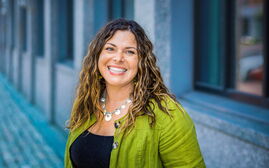Fluid Farms wins $50K at Launchpad entrepreneur competition
 Photo / Lori Valigra
Gorham Savings Bank LaunchPad 2016 competition winner Tyler Gaudet (center), co-owner of Fluid Farms Aquaponic Produce, is surrounded by judges (from left) Melissa Smith, president and CEO of WEX; Chris Claudio, CEO and co-founder of Winxnet; and Michelle Neujahr, director of Southern Maine Community College's Entrepreneurial Center. To his right are Tyler Frank, president of Garbage to Garden and winner of the Audience Choice Award; and Katie Bellerose, emcee, and Christopher Emmons, president and CEO, both of Gorham Savings.
Photo / Lori Valigra
Gorham Savings Bank LaunchPad 2016 competition winner Tyler Gaudet (center), co-owner of Fluid Farms Aquaponic Produce, is surrounded by judges (from left) Melissa Smith, president and CEO of WEX; Chris Claudio, CEO and co-founder of Winxnet; and Michelle Neujahr, director of Southern Maine Community College's Entrepreneurial Center. To his right are Tyler Frank, president of Garbage to Garden and winner of the Audience Choice Award; and Katie Bellerose, emcee, and Christopher Emmons, president and CEO, both of Gorham Savings.
Touting a goal of closing the gap in Maine’s ability to produce its own food year-round, Tyler Gaudet, co-owner of Fluid Farms Aquaponic Produce of Dresden, took the top $50,000 prize at Gorham Savings Bank’s LaunchPad 2016 competition Tuesday evening.
The event was held at the University of Southern Maine’s Hannaford Hall, where some 200 attendees cheered on the five finalists as they made 7-minute pitches followed by 5 minutes of questions from the judges. The judges were Chris Claudio, CEO and co-founder of Winxnet; Michelle Neujahr, director of the Southern Maine Community College Entrepreneurial Center; and Melissa Smith, president and CEO of WEX.
The $50,000 prize this year is up from the $30,000 in the previous three years.
“We’re working to make year-round agriculture both sustainable and economically viable,” Gaudet said during his pitch.
The company last year moved from its seasonal 3,000-square-foot heated hoop house in North Yarmouth to Dresden, where it is working to bring the first 15,000 square feet of its large greenhouse online by summer and the entire greenhouse within two years, giving it total space of 41,000 square feet.
Gaudet cited Maine Department of Agriculture numbers saying only 20% of Maine’s food is produced in the state.
“So greenhouse production is vital to closing these seasonal food gaps,” he said. Along with scaling its volume of produce, it is working with a hydroponic company to develop strawberries for its aquaponics system, which uses hybrid striped bass as fertilizer for the produce. “Can you imagine having a fresh Maine strawberry in the middle of winter?”
Gaudet said Fluid Farms will use the money for highly efficient heat pump systems for its new greenhouse.
Growing pains
Most of the five finalists cited growing pains, with several saying they were at a tipping point of needing money to buy equipment for efficiency and expansion in order to get into a position where they could start making a profit.
Such was the case with finalists Blue Ox Malthouse of Lisbon Falls, which uses local grains to make malt for craft breweries.
“We had a six-month delay due to faulty equipment,” said founder and maltster Joel Alex, who said the company subsequently restructured. “I’m here tonight because we need to make significant improvements in our scaling potential.” He said the $50,000 would help the company make critical investments in equipment that could help nearly triple its output volume, meet revenue goals and double the amount of employees and growers with which it works.
Good To-Go of Kittery, which sells all-natural, dehydrated gourmet meals for active adventurers, also said it needed to buy more equipment to become more efficient and to grow to a point where it could turn a profit.
Co-owner Jennifer Scism told the judges the company sold 20,000 meals in May, but it needs to double production to break even, which it could do with an expanded facility that’s scheduled to be up and running this week.
Garbage to Garden, another finalist, won the new Audience Choice Award, a prize valued at $10,000 for consulting services from pro-voke, iBec Creative, CP Inc. and Creative Imaging Group. The Portland company, which collects compostable food scraps from residents, schools and businesses and returns a bag of compost, is ready to expand into Boston, founder Tyler Frank told the judges.
Frank said the company hauls 10 tons of compostable food scraps daily in Portland, saving the city $100,000 annually.
And finally, UniteGPS of Portland adds GPS technology to waiting for the school bus so parents and students know each other’s whereabouts. CEO Christopher Bunnell says the company is in the process of scaling its operations, and that 115 school districts already are considering its Crosswalk cloud-based product.
Picking a winner
The judges scored the finalists on viability, that is, whether their business model is sustainable; whether they could adapt to increased demand; uniqueness; strength of management and support; whether the business will provide an economic benefit to Maine; how helpful the $50,000 will be to helping their business grow; and their presentation skills, according to emcee Katie Bellerose, who is in marketing at Gorham Savings.
She said the five finalists were chosen from a record of nearly 180 applicants from 70 cities and towns across Maine. Most applicants, 38 of them, were from Portland and another 13 from South Portland. Of the applicants, 31% were pre-revenue, 32% recently started generating revenue and the remaining 37% are already reinvesting to build their businesses.
Previous winners were Pika Energy of Westbrook in LaunchPad’s inaugural year in 2013, chocolate-maker Bixby & Co. of Rockland in 2014 and wallet and carry-gear maker Flowfold of Peaks Island in 2015.
Read more
Garbage to Garden is 'a for-profit with a mission'
Kittery maker of dehydrated foods finds success with outdoor-focused retailers
A promise of higher ag yields: Aquaponics offers new source of food
New malthouse doubles craft brewer access to local malts
Gorham Savings raising LaunchPad purse to $50K














Comments